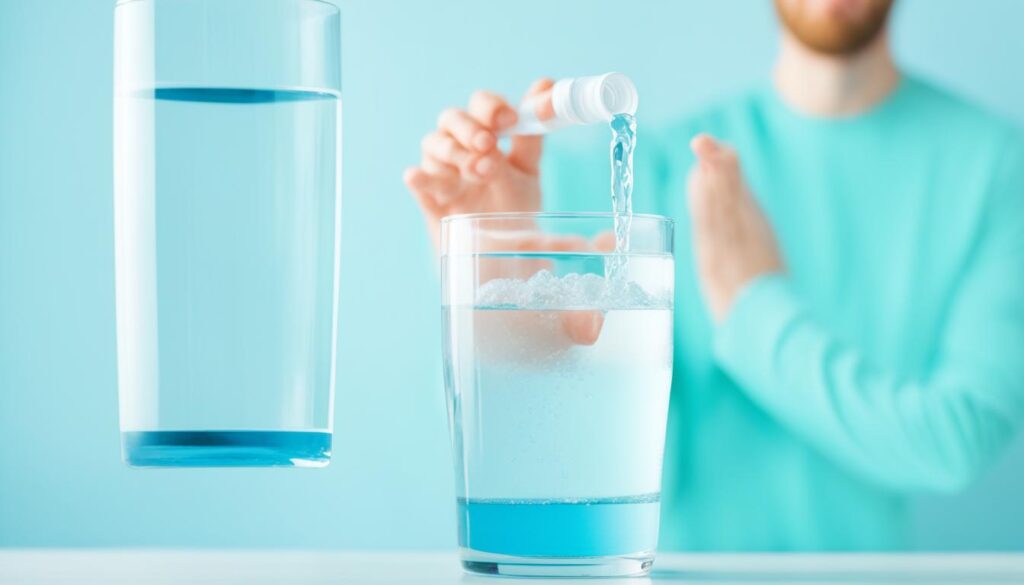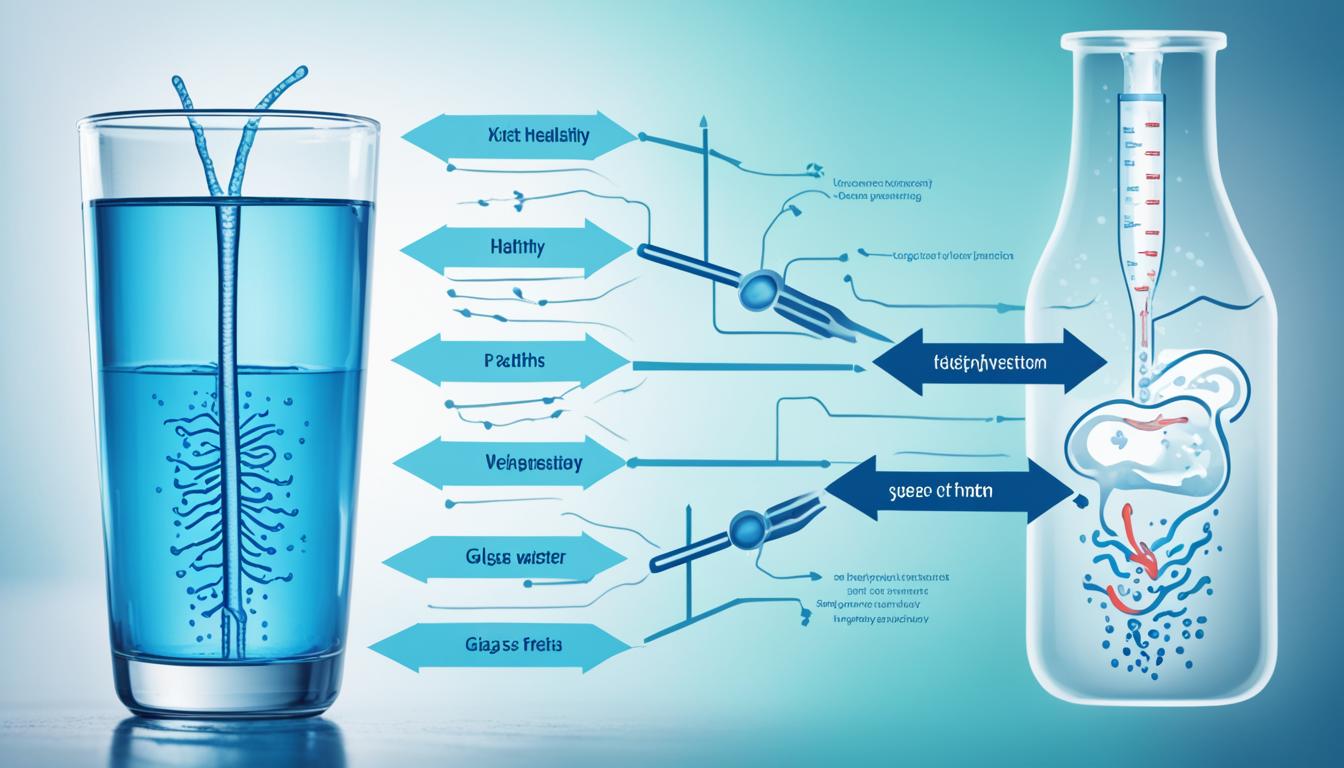Many people wonder how drinking more water affects bowel movements. Can increasing your water intake lead to diarrhea? Most people don’t drink enough water, so it’s key to look at how a water diet impacts digestive health. If you don’t drink enough, you might face dehydration. This affects digestion and can cause diarrhea. It’s crucial to know how water and digestion work together for a healthy gut.
Not getting enough water can lead to unnoticed health issues until pain arises. Lack of water can hurt digestion, making it hard for the body to get nutrients. This can cause stomach problems, including diarrhea. It’s important to know when your body needs more water. Signs include feeling thirsty, dizzy, and not going to the bathroom much. These warnings are your body’s way of saying it needs water.
As people work on staying healthy, they’re noticing how not drinking enough water affects them. Knowing what a water diet can do helps protect your stomach health. It’s a big step in taking care of yourself.
Exploring the Hydration-Digestion Connection
Hydration and digestion go hand in hand for good health. Looking into how drinking water affects our digestive system shows us the need for keeping fluids balanced. This is crucial for a healthy gut.
Understanding the Role of Water in Digestive Health
Our digestive tract needs enough water to work well. Water acts as a solvent for nutrients and helps move them through the gut. It helps produce saliva and breaks down food in the stomach and intestines.
Water also plays a key role in how our body handles waste. It ensures regular bowel movements and prevents constipation or diarrhea. This shows just how central water is for our digestion.

The Impact of Dehydration on Gastrointestinal Function
Not having enough water can shake up our digestive stability. It means our body may struggle to make digestive juices. This struggle can lead to digestive problems like diarrhea since the body pulls water from the colon to compensate.
Not drinking enough water makes water diet side effects worse. These effects can hurt the gut wall and negatively impact how our stomachs function.
Factors Leading to Dehydration and Its Symptoms
Several things can cause dehydration. Not drinking enough water, sweating a lot during exercise, or getting sick with vomiting or diarrhea are common causes. Symptoms such as thirst, dry mouth, tiredness, and feeling dizzy hint at dehydration. Dark urine also signals the need to drink more fluids.
It’s important to watch out for dehydration, especially when it’s hot or during intense workouts. People with certain health conditions or those taking diuretics should be extra careful. Adding electrolyte and mineral drops to your water can help prevent dehydration. Staying well-hydrated supports a healthy digestive system and keeps our gut in good shape.
Water Diet Cause Diarrhea: The Underlying Mechanisms
It’s important to know how a water diet affects our guts, especially the problems linked to drinking too much water. Drinking too much water can disrupt the way our stomachs work and the balance of good bacteria in our guts. This can cause issues like diarrhea.
How Excessive Water Intake Disrupts Intestinal Motility
Drinking too much water can actually cause overhydration. This problem speeds up how quickly food and water move through our guts. Because of this fast movement, our bodies don’t absorb nutrients and water well, leading to diarrhea.
The Link Between Hydration Levels and Intestinal Flora Balance
The right amount of water is key for a healthy gut. But, too much water weakens this balance. It messes up the environment in our intestines. This can lead to bad gut health and diarrhea.
Consequences of Water Redistribution in the Body
Overhydration is about more than just drinking a lot. It’s about how our bodies deal with too much water. If we have too much water, our bodies try to even things out. Sometimes, this means moving water to our bowels. This can cause diarrhea as a way to get back to balance, but it feels bad.
| Factor | Effect on Digestive Health | Potential Consequences |
|---|---|---|
| Excessive Water Intake | Accelerates intestinal motility | Diarrhea, nutrient malabsorption |
| Gut Flora Imbalance | Diminishes healthy bacteria | Digestive distress, immune response |
| Water Redistribution | Pooling of water in the intestines | Triggering of diarrhea to expel excess water |

Preventing Diarrhea: Safe Water Intake and Dietary Considerations
Diarrhea prevention is possible by combining proper hydration and diet management. It’s important to drink safe drinking-water to avoid germs that can cause stomach issues. Also, practicing improved sanitation and hand washing with soap reduces the risk of getting sick. These simple steps are key to keeping your stomach healthy.
Strategies for Balanced Hydration without Side Effects
Understanding how much water you need is the first step to avoid hydration problems. It’s also key to have treatments like oral rehydration solution (ORS) and zinc supplements ready for diarrhea relief. Keeping a good balance helps us stay hydrated just right for our health.
Role of Dietary Fibers and Nutrients in Preventing Diarrhea
Eating right is also crucial for preventing diarrhea. This means eating plenty of dietary fibers and essential nutrients. These help keep a healthy gut and regular bowel movements. Choosing nutrient-rich foods supports our body’s defenses against stomach problems.
Identifying Personal Hydration Needs and Limits
It’s important to know how much water you need. Everyone is different, depending on things like exercise, weather, and health. Knowing how much water to drink helps us stay balanced and healthy. This way, we can prevent dehydration and related problems effectively.




